

After the war began in Ukraine, the Russian book market experienced heightened censorship. Literature featuring LGBT themes and works by authors critical of Putin became scarce. However, rather than stifling readership, these bans have generated a notable reaction. The demand for books by “foreign agents” such as Mikhail Zygar and Tamara Eidelman is growing. Moreover, there has been an increase in sales of dystopian novels and books exploring German life during World War II, as well as the downfall of dictatorial regimes. A correspondent of The Insider visited Moscow bookstores and observed that, despite the Kremlin's attempt to enforce its agenda, some stores' book displays resemble a protest against war.
Content
“Telltale displays”
Orwell books are selling like hotcakes
Z bookstores
Childhood in Boots
There are foreign agents and foreign agents
Literary Homophobia
Flawed musicians
“Telltale displays”
“The book, which had been in preparation for three years, came out at the end of January and quickly became a bestseller throughout Russia. The first print run disappeared almost immediately, and since then there have been three more,” Russian historian and political scientist Alexander Baunov marvels at the success of his work. Baunov's book, titled “The End of the Regime: How Three European Dictatorships Ended,” delves into the dictatorships of Spain, Portugal, and Greece in the twentieth century. According to the author, the book did not sell out due to a sudden surge of enthusiasm for the history of Southern Europe. Instead, the interest in the past stems from a desire to find answers to pressing present-day questions. These questions revolve around living under an authoritarian regime, understanding the mechanisms behind the downfall of right-wing dictatorships, and contemplating the prospects of Russia transitioning to a democratic system.
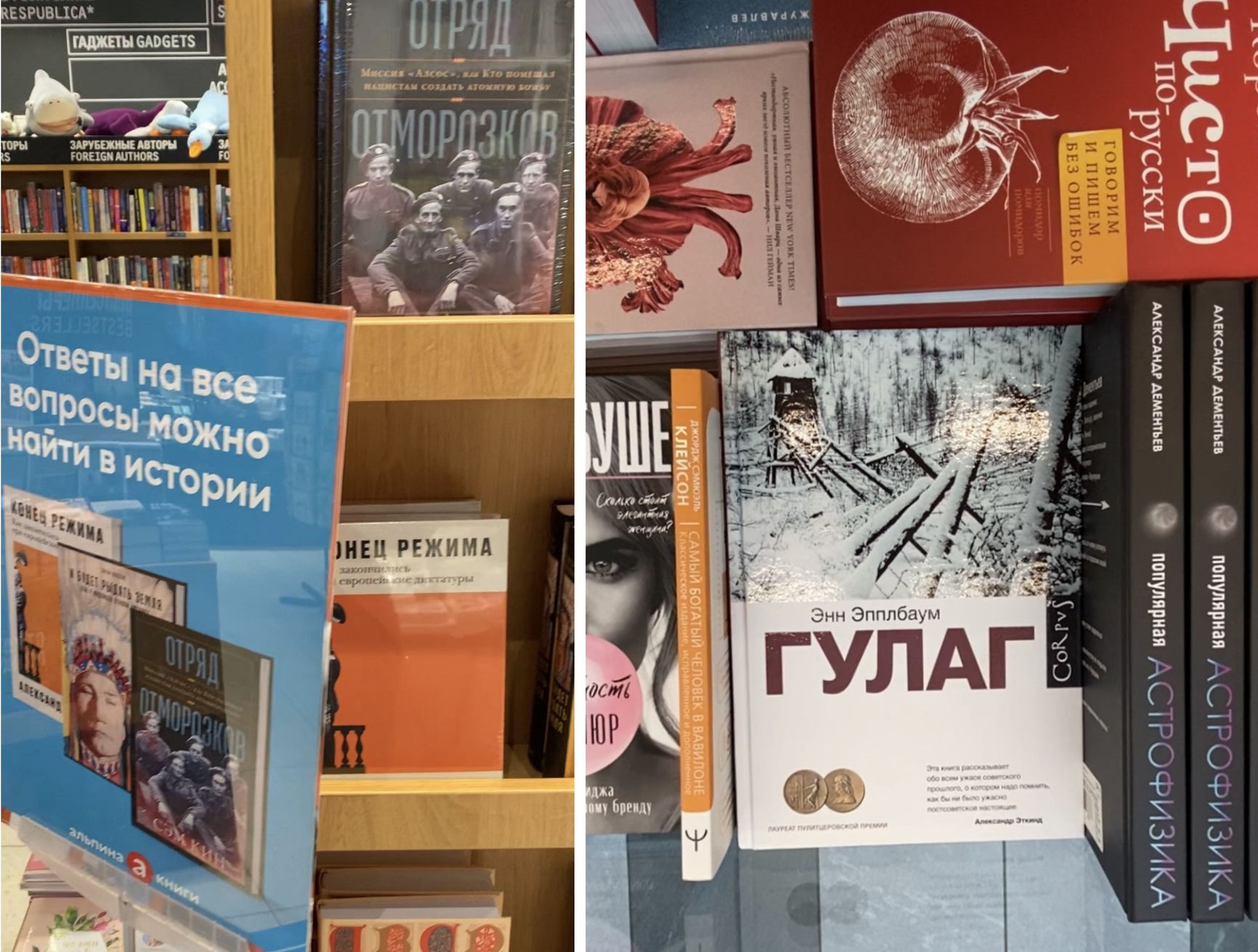
Book displays in Respublika and Chitai-Gorod stores
The presence of bestseller display racks suggests a significant rise in reader interest in anti-war literature. This contradicts the theory that Russian society universally supports war. A notable example is the surge in sales of Nicholas Stargardt's book, “The German War: A Nation Under Arms, 1939-1945,” following the commencement of “partial” mobilization. In late September and October, compared to September 7-20, sales of the book increased fivefold in Chitai-Gorod stores and 17-fold on LitRes.
In certain stores, the arrangement of books on the bestseller racks now bears resemblance to an anti-war protest. In the busiest shopping areas, prominently positioned near the entrances, one can find anti-war literature, books exploring life during the Third Reich, and publications that delve into the notions of guilt and responsibility within a nation governed by a dictator.
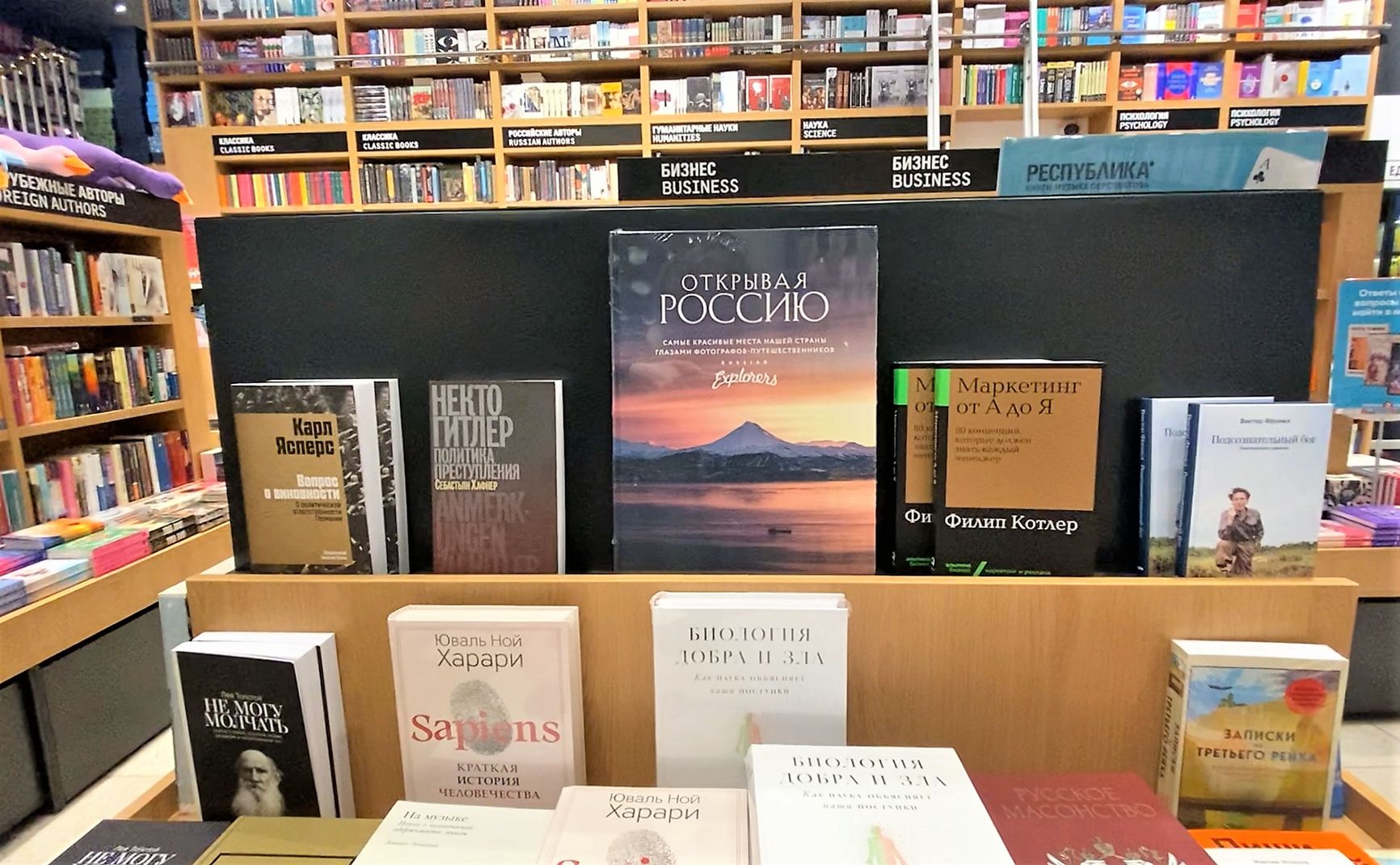
A book rack in a Respublika store
Leo Tolstoy's collection of articles titled “I cannot keep silent” serves as a captivating slogan displayed at the entrance of the Respublika bookstore chain. Published in 2023 by Alpina Publisher, the book features three articles by the renowned writer, including the anti-war piece “Come to your senses!” which was penned in response to the Russo-Japanese War.
Adjacent to it on the same display rack is “The Question of German Guilt” by Karl Jaspers, a German philosopher. Alpina Publisher reissued Jaspers' treatise on the culpability and accountability of the German populace for Nazi atrocities in 2022, following the eruption of hostilities in Ukraine. Also present is “Someone Hitler. The Politics of Crime” by Sebastian Haffner, a German-British writer and journalist. This third edition of the book, published by Ivan Limbach Publishers in 2022, serves as an analytical commentary on Haffner's other work, “The Story of a German,” which can also be found among the bestsellers. Haffner's aim was to comprehend the methods through which Nazi ideology was imposed and how they were either resisted or not resisted by Germans. The book's synopsis highlights the importance of “understanding how and why an individual from the masses can rise to become a popular politician, leading the crowd towards criminality, particularly in an era where technological advancements offer endless possibilities for transforming personal psychosis into mass hysteria.”
At the entrance of the Moskva store on Tverskaya Street, a prominent display features Baunov's book, “The End of the Regime: How Three European Dictatorships Ended.” Additionally, at the Non/FictioN international book fair of intellectual literature, the book was creatively showcased in close proximity to the collection catalog titled “A Muscovite's Dream.”

A book display rack at the Non/FictioN International Book Fair, April 8
On the bestseller racks at select Chitai-Gorod chain stores, one can find a notable collection of books centered around the Second World War and its aftermath as seen through the perspective of Germans. Among these titles are “The Demon-Haunted Land” by Monica Black and “A Nation under Arms” by Nicholas Stargardt. Another popular choice is “Travelers in the Third Reich: The Rise of Fascism Through the Eyes of Everyday People” by Julia Boyd, which comprises previously unpublished diaries and letters from individuals who visited Germany between World Wars I and II.
In a Chitai-Gorod store, a bestseller rack prominently features two books: “Gulag: The Web of Great Terror” by the American-British author Anne Applebaum and “Authoritarian Russia: An Escape from Freedom, or Why Democracy Fails in this Country” by political scientist Vladimir Gelman. Additionally, Erik Larson's “In the Garden of Beasts: Love and Terror in Hitler's Berlin” can be found in nearly all major bookstores in Moscow.
Bookstores with a leaning towards the government's perspective, such as Moscow House of Books, Biblio-Globus, and Molodaya Gvardiya, exhibit bestseller racks that are adorned in a neutral manner. These racks predominantly showcase books on personal development, psychology, and works of fiction.
Orwell books are selling like hotcakes
“A lot of people are buying “1984,” apparently they are afraid that the book will be banned,” says a bookseller at a Chitai-Gorod store, explaining the increased demand for George Orwell's most famous work. The anti-utopian novel, which explores dictatorship and propaganda in a totalitarian society, was once forbidden in the Soviet Union but has gained immense popularity in Russia. Numerous major publishing houses have reissued Orwell's books, with a particular focus on “1984.” Many bookstores prominently feature this anti-war work among their bestsellers, while some even dedicate entire sections or islands solely for showcasing Orwell's publications. The novel is available in various formats, including paperback and hardcover, as well as in both large and small sizes. Additionally, there are comic book adaptations based on “1984.”
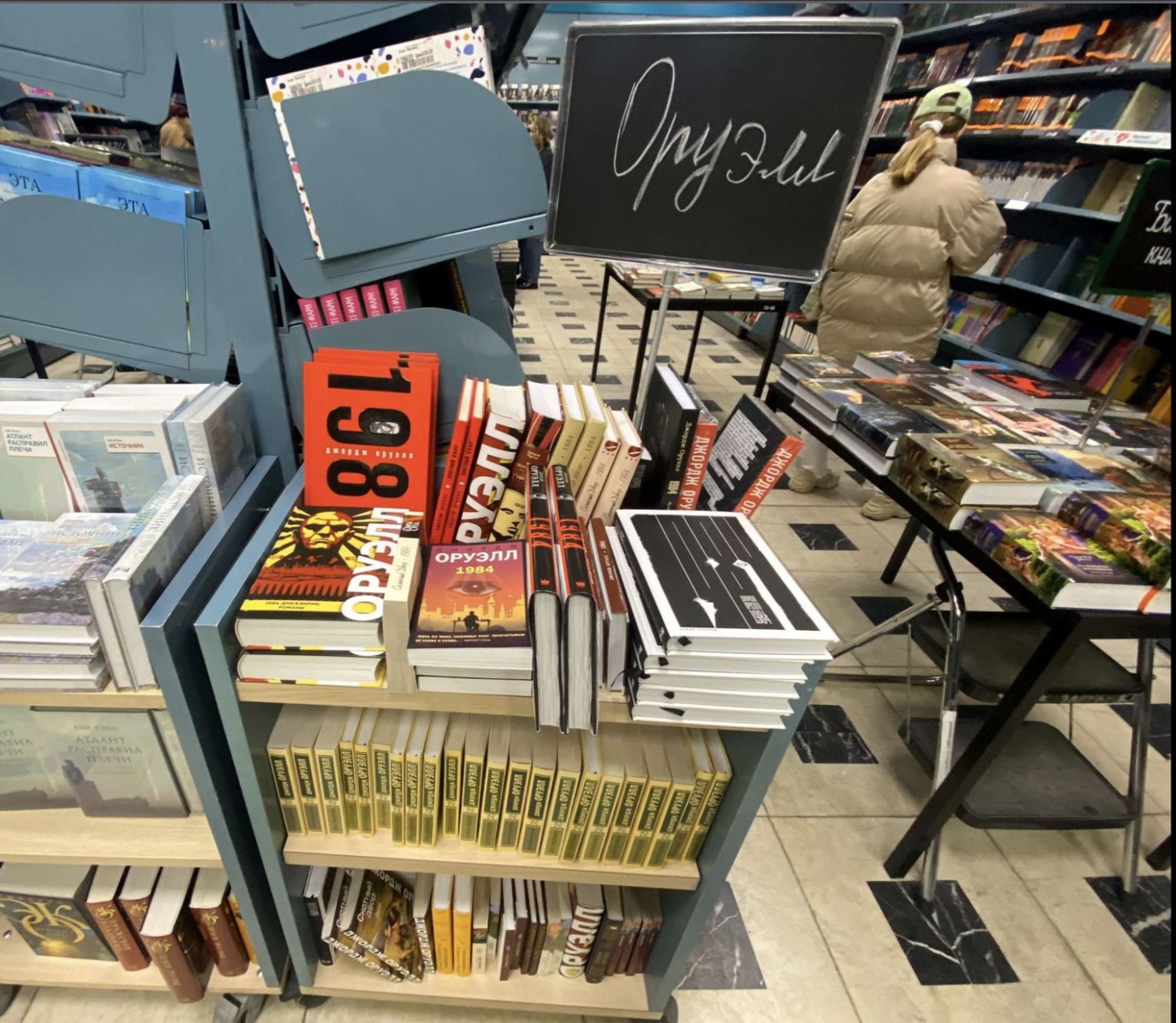
An Orwell books display at Moscow House of Books
A bookseller at Moscow House of Books says, with a sigh, “These books tackle a highly relevant subject matter! We're moving in the same direction, by leaps and bounds. Orwell's works are selling like crazy. He is our top-selling author. We dedicated a separate rack for his books three years ago, but their sales have only improved since then.”
Interest in Orwell was already noticeable prior to the full-scale invasion of Ukraine. He ranked among the top ten best-selling authors. However, in March 2022, sales soared by 5-6 times, as reported by the publishing house AST. Interestingly, a similar surge of interest in Orwell occurred in the United States after Donald Trump assumed power in 2017. Sales of other dystopian novels depicting authoritarian regimes also experienced an increase, such as Sinclair Lewis' “It Can't Happen Here,” written during the rise of fascism and Nazism in Europe in 1935 (ranked 46th), and Aldous Huxley's “Brave New World.”
Within numerous Chitai-Gorod chain stores, the novel holds a prominent position in the hottest spot — an eye-catching book rack dedicated to dystopian literature, conveniently placed across from the entrance. It's not only the book itself that is available for purchase, but also an accompanying board game titled “1984.” Prospective buyers are invited to partake in the experience by either assuming the role of a dictator or joining the ranks of the opposition.
The gameplay experience varies significantly depending on whether you choose to play as the Big Brother or as part of the opposition. As Big Brother, you'll face the challenge of exerting control by issuing directives and overseeing subordinates. On the other hand, the opposition's objective involves dismantling surveillance cameras, setting up and removing hiding spots, navigating through various districts of the city, and, naturally, undermining Big Brother's authority,” the game description reads.
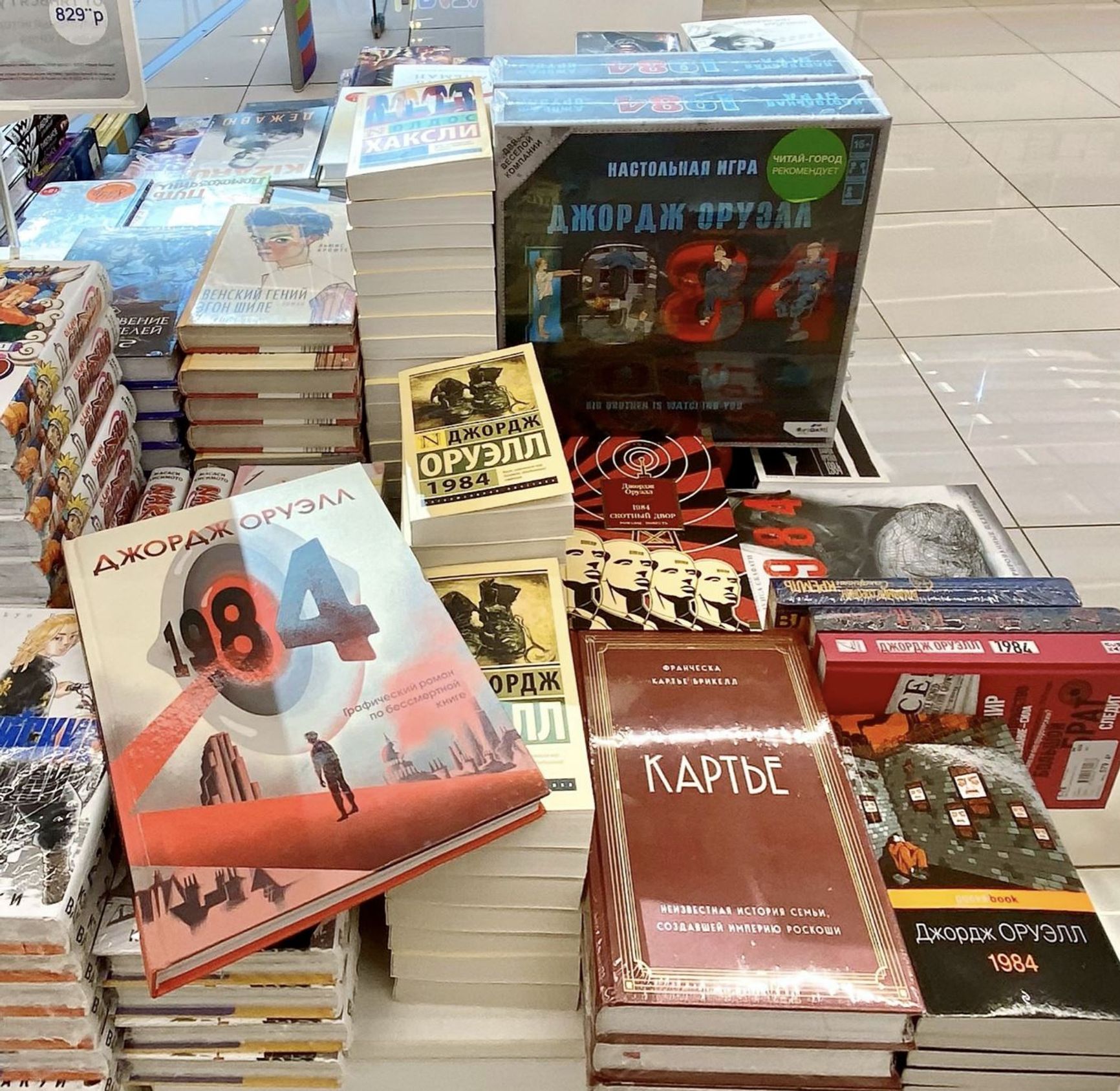
A book rack in a Chitai-Gorod store
Unlike in Belarus, the novel “1984” has not yet been forbidden in Russia. However, following the invasion of Ukraine, there have been instances of Russians being detained for staging protests featuring quotes from the writer's books. At least three documented cases have been reported in St. Petersburg, Yekaterinburg, and Moscow.

A protester holding a banner with quotes from 1984 in St. Petersburg (left); a banner with quotes from the novel held by a female protester in Moscow (right)
Z bookstores
Despite that, not all bookstores in Moscow align in their selection of books for their bestseller shelves. Molodaya Gvardiya book house, for instance, features distinct “islands of patriotism” where ideologically charged literature occupies prominent positions. Among these racks, a noteworthy centerpiece consists of books by presidential aide Vladimir Medinsky, focusing on “authentic Russian history.” This series of works serves to debunk myths surrounding the Russian people, addressing alleged stereotypes related to technological backwardness, laziness, drunkenness, and other unfavorable misconceptions.
On the same book rack, you can find “SVO. Clausewitz and the Void” by Mikhail Golovlev, a reserve FSB colonel and former minister of state security for the “DNR” (Donetsk People's Republic). This work, presented as the first comprehensive analysis of the achievements and shortcomings of the Ukrainian invasion, advocates for the very notion of the invasion itself. “Russia... has made a historic-level bid for a world order more just than Western hegemony,” the abstract says.

Bookshelves in the Molodaya Gvardia bookstore
The “History of Russia” section is particularly noteworthy, although a more accurate term would be “History of Russia through the lens of Putin's propaganda.” In this section, positioned across from a calendar featuring Putin, you will find works authored by contemporary Russian propagandists. These include titles such as “The Radical Doctrine of Novorossiya” by Leonid Ivashov, “Novorossiya: A Brief History from Catherine II to Putin” by Vladimir Myasnikov, “The Denazification of Ukraine” by Armen Gasparyan, and numerous others.

An island book display in the Molodaya Gvardiya bookstore
The Molodaya Gvardiya bookstore dedicates a substantial space to history books, encompassing nine bookshelves and several display islands. This section holds the largest presence within the bookstore. Within the shelf housing works by Lenin and Stalin, one can find books on the history of the NKVD and party officials, which are positioned alongside works by Shoigu and the writings of Putin. Adjacent to this, a comprehensive series of books explores the theme of “enemies of the people,” including titles like “Europe vs. Russia,” “NATO and Russia,” “Russia and Poland,” and “Russia and Finland.” It becomes evident that there is a notable emphasis on “patriotic non-fiction” publications, with many of these propaganda works released following Russia's full-scale invasion of Ukraine. However, enthusiasts of such literature may be surprised to find unexpected titles in proximity, such as Mikhail Fishman's publication “Successor” about Boris Nemtsov and Stargardt's bestselling book “A Nation under Arms.” Additionally, a publication on “hybrid warfare” can be found nearby.

The “anti-Western” shelf in the Molodaya Gvardiya bookstore
At Molodaya Gvardiya, propagandists Boris Satanovsky, Leonid Ivashov, and Zakhar Prilepin held book presentations, highlighting their respective works. During the summer of 2022, the bookstore garnered attention for its decision to remove Boris Akunin's books from its shelves. Although the writer has not been labeled a “foreign agent,” he openly expressed his opposition to the Russian invasion of Ukraine and, prior to that, the annexation of Crimea. In response to this move, publisher Zakharov took a strong stance by withdrawing all of Akunin's books from Molodaya Gvardiya. In a message shared on the social network VKontakte, the publisher said, “So there will never be any more of our books in the Molodaya Gvardiya store on Polyanka. Not even after the sunrise. 'To the morgue means to the morgue', that's what the doctor ordered.”
Childhood in Boots
The Molodaya Gvardiya bookstore has a distinct and prominent section dedicated to children's military literature. It's the first section you come across upon entering the bookstore. Additionally, on May 9th, the store set up a special book display area specifically for children's military books.

Special May 9 display area at the Molodaya Gvardiya bookstore
The first row of the special display area features a book series called “Wartime Childhood” by Detskaya Literatura [Children's Literature] Publishers. This series primarily consists of books about the Great Patriotic War, originally written during the Soviet era and reissued in recent years. However, there are also more recent works included, such as Olga Butler's story titled “The Last Cat in Boots,” which recounts events during the Leningrad Siege.
Children are encouraged to take pride not only in military achievements but also in the accomplishments of space exploration. However, even the name of the display area, “Thank you, Yura, the space is ours!” implies that Russia's space conquests are seen as something of the past.

An display area in the Molodaya Gvardiya bookstore
There are foreign agents and foreign agents
“Zygar's books haven't been on sale for quite some time as they were removed from circulation after their wedding <i.e. the wedding of Zygar and actor Jean-Michel Shcherbakov in 2022 – The Insider >, which took place in the summer. Therefore, it was a coincidence that he was subsequently listed as a foreign agent,” says a bookseller at Biblio-Globus, one of Moscow's largest bookstores. Similarly, Dmitry Glukhovsky's books, known for his post-apocalyptic novel series about the subway, are also unavailable for sale since he was declared a “foreign agent.” This situation is mirrored with books by historian Tamara Eidelman and writer Dmitry Bykov, which cannot be found at either the Moscow House of Books on Arbat or Molodaya Gvardiya on Polyanka.
Previously, these authors were prominently featured in display cases and prominent display racks at the entrance of many bookstores. However, everything changed in December 2022 when Russia implemented stricter regulations regarding “foreign agents.” These regulations included prohibitions on educational activities for minors and the production of informational products, including books, aimed at children. The law now requires publications to be labeled to safeguard children from potentially harmful content, although the specific guidelines for implementation are not clearly defined. As a result, most bookstores started covering books with transparent film and applying an age restriction of 18+ to comply with the new regulations.
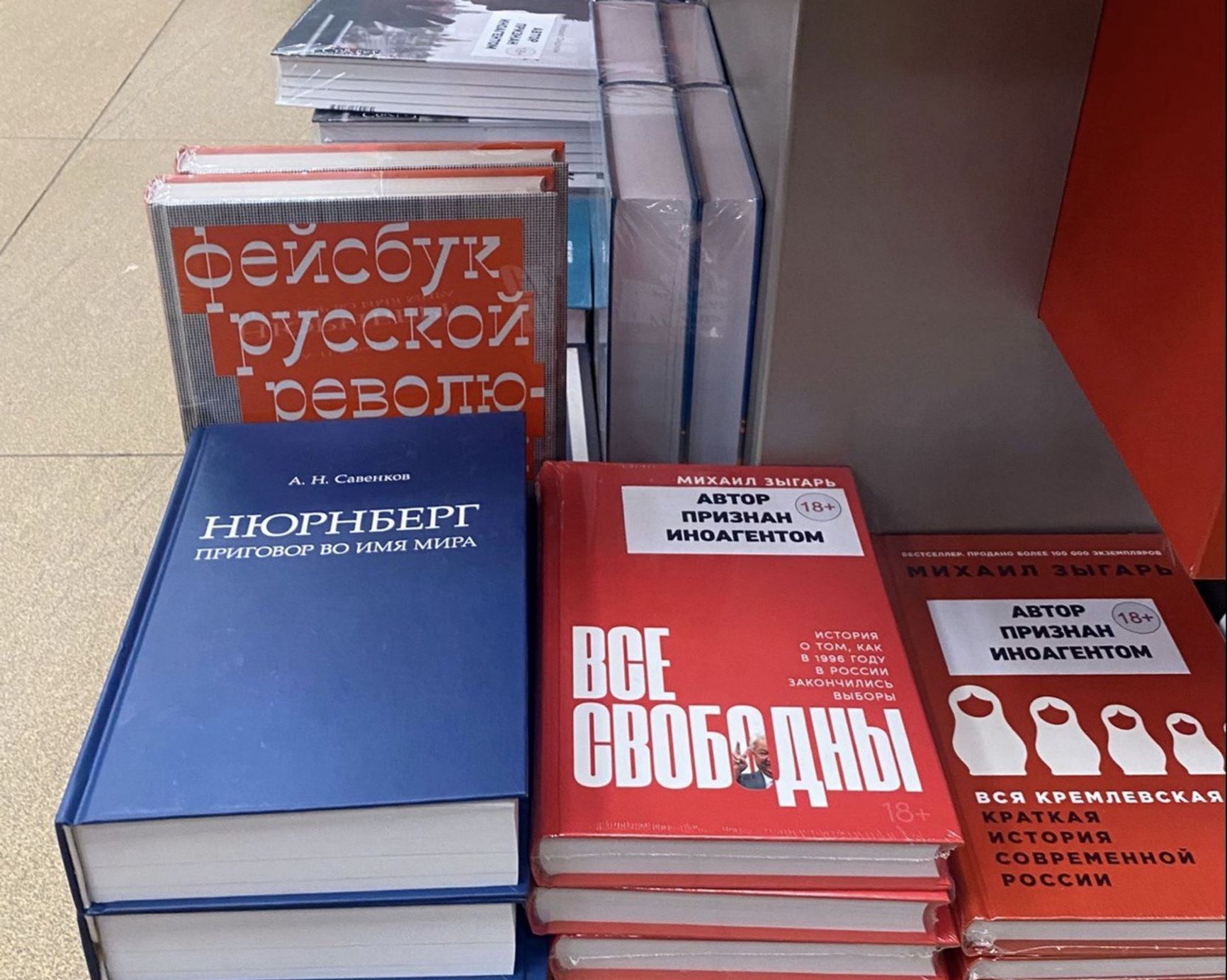
Moskva Bookstore on Tverskaya Street
The decision to remove books from sale is voluntary on the part of the bookstores and not mandated by the law. The requirement to withdraw literature by “foreign agents” is not explicitly stated in the law. It appears that Biblio-Globus, Moscow House of Books, and Molodaya Gvardiya are either displaying loyalty to the authorities or taking precautionary measures by removing books by “foreign agents” from their inventory. However, this action is detrimental to their business since books such as Zygar's “All the Kremlin's Men” and Eidelman's “How Propaganda Works” were highly popular and were bestsellers in 2022.
Contrary to the other bookstores, the Moskva bookstore on Tverskaya Street has a different approach. Books by “foreign” writers are prominently displayed in the center of the hall, albeit on the lower and middle shelves. Despite being located approximately a kilometer from the Kremlin, this bookstore offers books by Mikhail Zygar, Tamara Eidelman, Mikhail Fishman's “Successor,” and “The First Scientific History of the War of 1812” by journalist and historian Yevgeny Ponasenkov. Additionally, in the film literature department, you can find publications by producer Alexander Rodnyansky and film critic Anton Dolin. These books are sealed in transparent film and labeled with a sticker indicating their “foreign agency” status.

Moskva Bookstore on Tverskaya Street
In the Chitai-Gorod chain stores, the books by Zygar, Glukhovsky, and Bykov are sold without the “foreign agency” sticker but are covered with transparent film. These books have been removed from window displays and central racks. Instead, the prominent display racks now feature works of fiction and non-fiction on non-political subjects, as well as literature on psychology and personal growth. The books by “foreign agents” are deliberately placed in inconvenient locations, either too high or too low, and often covered by other books, making them difficult to find.
The publications of these authors can also be found in the Respublika chain, where they are labeled as “foreign agents.” In December 2022, a video circulated on social media, supposedly filmed in one of the chain's stores, showing books by “foreign agents” being wrapped in thick opaque paper. However, it seems that Respublika has since discontinued this practice and now only uses the “foreign agent” sticker. Employees from several Moscow stores have told The Insider about “inspections being conducted by authorities in the bookstores.”

A book by a “foreign agent” in a Respublika bookstore
Certain stores have chosen to conceal books by Lyudmila Ulitskaya. Although the writer has not been declared a “foreign agent,” there has been information circulating on the internet suggesting that she is included in an unofficial list of “undesirable” authors whose works should be removed from stores. However, editions of Ulitskaya's books can still be found in Chitai-Gorod and Respublika bookstores, and occasionally, her books are even displayed in the shop windows.
Once authors are labeled as “foreign agents,” there is a noticeable increase in reader interest in their works. Concerns about a potential ban on these books have sparked a surge in demand, as confirmed by a bookseller from an online bookstore in an interview with The Insider. “There is a significant demand for books like “Empire Must Die” and works by Zygar in general. People are also showing increased interest in literature by “foreign agents” and LGBT topics. Dmitry Glukhovsky's books are frequently requested as well. There is a general understanding among readers that these books could potentially face a ban at any given time.” An employee at the Moskva store mentioned the high demand for Eidelman's books, particularly her work “How Propaganda Works,” which has already sold out.
Interestingly, certain writers labeled as “foreign agents” have been perceived as less “undesirable” in some instances. For example, in a particularly vigilant bookstore, a book by Lev Gudkov, the former director of the Levada Center (which was declared a “foreign agent” in 2016), was unexpectedly found on a standalone display. It is worth noting that Gudkov himself does not hold the “foreign agent” status. Similarly, another cautious store exhibited a book by Mikhail Fishman about Boris Nemtsov without any markings, tape, or even an age restriction label of 18+.
Literary Homophobia
During the Non/FictioN 2023 book fair in the capital, booksellers from Ripol publishing house expressed their frustration, stating, “They didn't explain in any way or refer to any law! They just told us to put the book away.” This incident occurred in an atmosphere of heightened tension, which may have been unprecedented for the event's 25-year history. Several “inspectors” specifically targeted certain booths, demanding the removal of books like the world bestseller “Middlesex” by Pulitzer Prize winner Jeffrey Eugenides. Similar fates befell other books, including Anna Starobinets' “Fox Fords.” It is important to note that while Starobinets is not recognized as a “foreign agent,” her opposition views have made her a target.
The booksellers expressed their outrage at the situation, but they felt unable to argue with the “inspectors.” According to The Insider's sources, book publishers and sellers have lost their clarity on what is subject to censorship following the stricter laws on “foreign agents” and the ban on “LGBT propaganda.” The censorship has been most pronounced in Russian and translated literature that includes references to same-sex relationships. A significant turning point occurred in December when President Putin signed a law prohibiting the promotion of non-traditional sexual relationships. As a result, popular works with LGBT themes disappeared from both physical shelves and online stores.
“The book 'Summer in a Pioneer Tie' has been completely removed from circulation. It is not even available on the Popcorn Books website. My fiend saw it listed on Avito, where it was being sold for approximately 20,000 rubles. It was quickly purchased,” says a bookseller at a Chitai-Gorod store.

In an act of protest against censorship, Popcorn Books has chosen to display Article 29.5 of the Russian Constitution, which prohibits censorship in Russia, on the cover of books that discuss same-sex relationships.
The novel by Elena Malisova and Katerina Silvanova, depicting a relationship between a pioneer and a camp counselor, initially appeared online in 2019 and was later published in paper format by Popcorn Books in 2021. The book gained significant popularity and became the second best-selling book of 2022, generating sales of nearly 50 million rubles. However, as its popularity peaked in December, President Putin signed a law prohibiting “LGBT propaganda,” leading to the withdrawal of the book from circulation. In early February 2023, the writers were designated as “foreign agents,” subsequently facing threats, while Popcorn Books faced its first administrative case under the law against “LGBT propaganda.” The authors' harassment was intensified by numerous appeals from figures such as Zakhar Prilepin, Dmitry Mikhalkov, and State Duma deputies.
Several books with LGBT themes published by LikeBook, a publisher specializing in the Young Adult genre, have also vanished from store shelves. One notable example is Max Falk's debut novel, “Shattered.” In October 2022, the publisher took the precaution of blacking out approximately 3% of the text, which contained descriptions of an intimate relationship between two young men. Despite these efforts, the novel was still ultimately withdrawn from circulation.

Max Falk's book “Shattered”
The publisher Ridero asked writer Masha Pushkina to remove from her book “Bipolar Explorers. Unmasked” a fragment about political prisoner Sasha Skochilenko, detained for “fakes about the Russian army”. The publisher asked to remove several quotes from Sasha: “Now I live together with my girlfriend Sonya. <...> We are fed up with homophobia <...> I also dream of marrying Sonya and spending my honeymoon in Amsterdam.” Ridero explained that there is no clear understanding of which books would be considered a violation of the law which prohibits “LGBT propaganda”.
The publisher also asked Kazakh writer Margo Ervand to edit her book. The neural network that checks literature for LGBT content found a minor gay character in her work, “Temptations of Solitude.” The writer was offered to “either cut the character's arc or make it 'correct' in terms of Russian laws.” Ervand refused and withdrew her book from sale.

A shelf with books by Medina Mirai
Stores frequently encounter challenges from “vigilant citizens” who insist on the removal of books that they believe promote LGBT individuals. These activists often share their endeavors online, recounting instances where they confronted bookstore staff. “I asked a salesperson about the placement of an 18+ book with LGBT propaganda in a highly visible location that could be accessed by young audience, including 12-year-olds,” a bookstore visitor bragged. Despite the saleswoman's explanation that the display was arranged through an agreement between the publisher and store management, the woman accused the store of engaging in “gay propaganda.”
Flawed musicians
The absence of books on Russian rock is another significant impact. Moscow House of Books no longer offers biographies of musicians who have been labeled as “foreign agents” or those who have expressed opposition to the Russian invasion. Works on renowned bands like DDT, Mashina Vremeni, and artists like Alla Pugacheva are now missing from the shelves. There is a noticeable shift towards a focus on foreign musicians, with extensive sections dedicated to figures such as Mozart, The Rolling Stones, Eminem, Billie Eilish, Rammstein, Freddie Mercury, Michael Jackson, and a substantial portion of the shelf dedicated to The Beatles.

A similar scenario can be observed at the Molodaya Gvardiya bookstore. While a book about Alla Pugacheva was discovered on the lowest shelf, it should be noted that the title “Alla Pugacheva and Her 50 Men” does not primarily focus on her artistic career. Interestingly, this book is positioned in close proximity to “Turncoats and Playactors” by Valery Golovsky, which carries symbolic significance. Likewise, a book about Zemfira was found in the bookstore on Polyanka, but it was placed on the second-to-last shelf from the bottom.